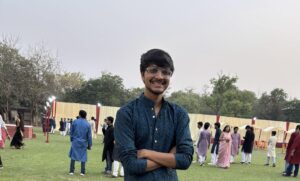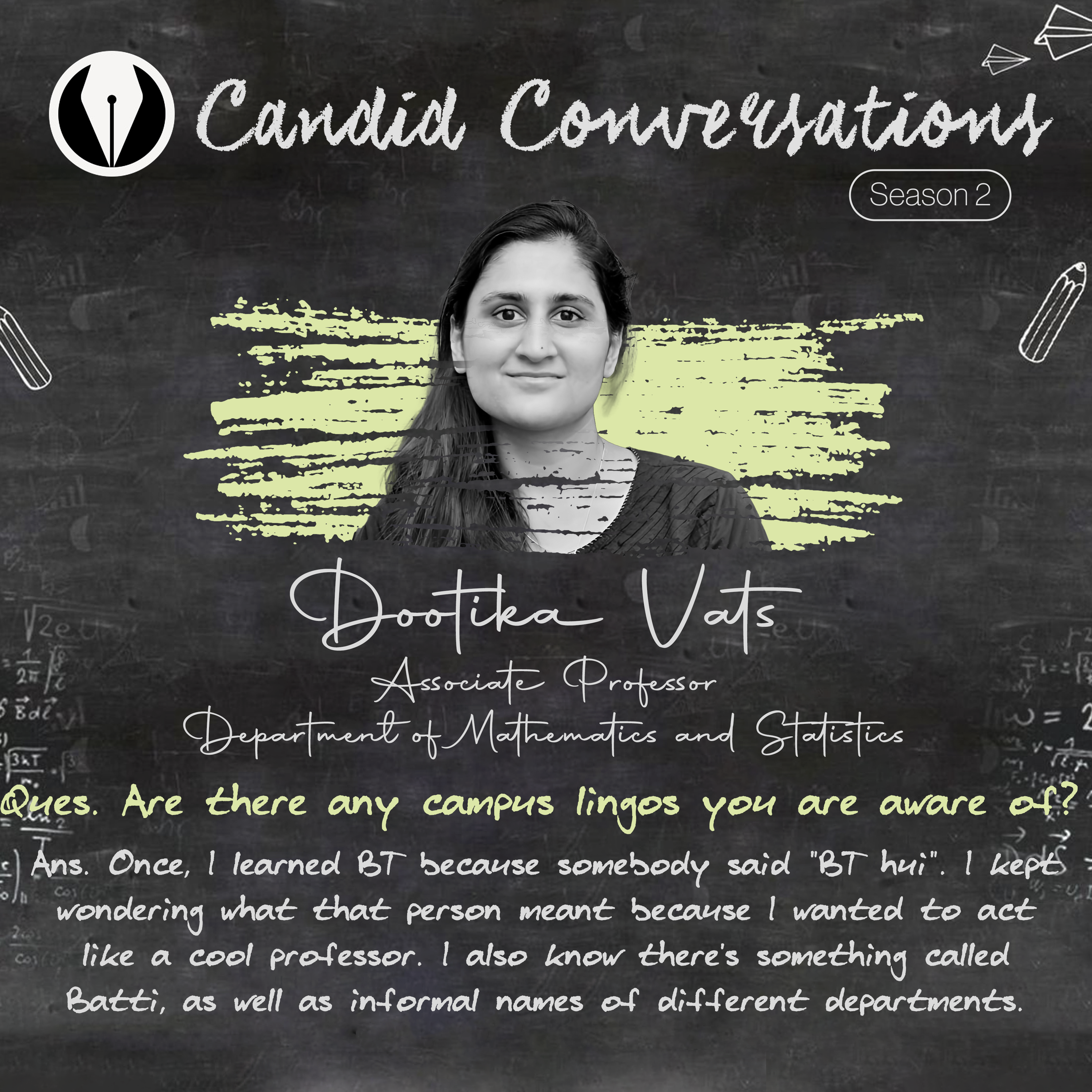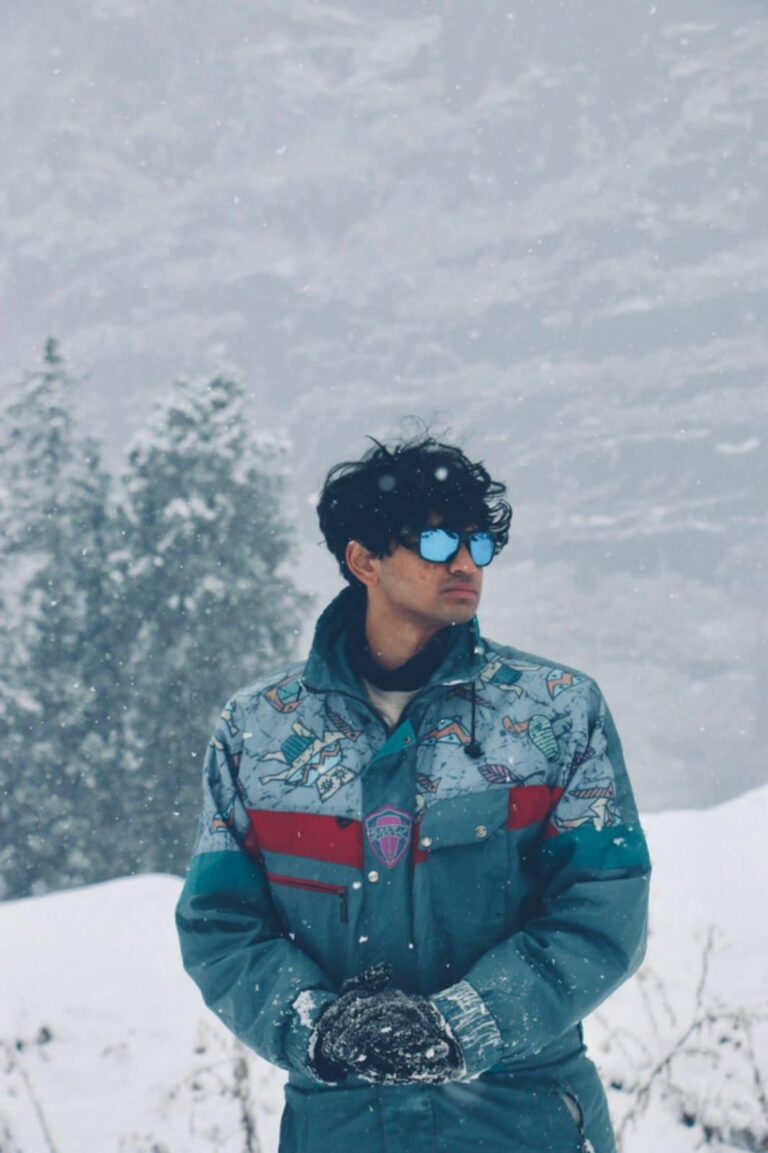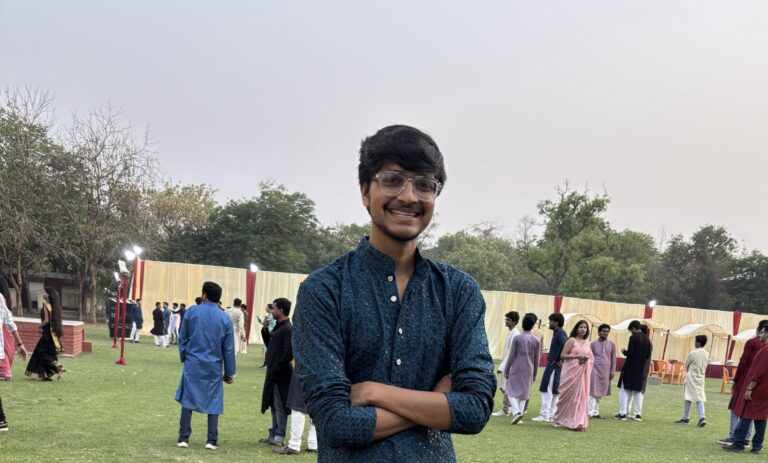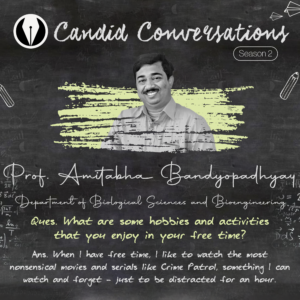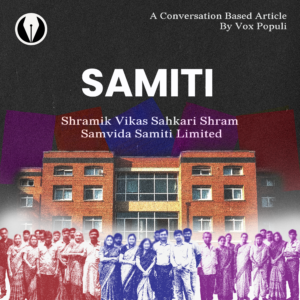Disclaimer: Vox Populi, IIT Kanpur, is the exclusive owner of the information on this website. No part of this content may be duplicated, paraphrased, or interpreted in any other way without written consent from Vox Populi. If you want to reproduce any of the content on this page, please contact our chief editors directly or reach out to us by email at voxpopuli@iitk.ac.in
Have you ever wondered about the lives of your professors beyond the lecture halls and labs? Were they just like us as students? What paths might they have taken if not for academia?
Vox is back with Season 2 of Candid Conversations with Professors @IITK, where our professors share their journeys, interests, and unfiltered insights into life at IITK and beyond.
Join us for the fourth part of this series, as we sit down with Professor Dootika Vats from the Department of Mathematics and Statistics. In this insightful interview, Professor Vats reflects on her academic journey, the life lessons she would share with her 20-year-old self, and her hobbies, from cooking to her love for cinema. She opens up about her favourite spots on campus, her passion for teaching, and the deep connection she feels with her students. An all time foodie, she also shares her culinary indulgences and her dream dinner companions. Read on to discover her inspiring philosophy, academic insights, and much more!
- If you weren’t a professor, what would your profession be?
I’d probably be jobless, homeless somewhere. If I were not a faculty member, I would probably be doing some corporate job in management-type situations. Not that I would have enjoyed it a lot. I would have just been doing that because I would have turned my brain off and said I would just do what people do. I chose this profession because I gave it some thought. If I were to choose a career at this point, though, I would be a terrible film writer, a horrible one. If you asked me when I was 11 or 12, I would be a cricketer. So, the answer is very different based on when I would decide.
- What would you say to your 20-year-old self?
I would first tell my 20-year-old self to stop being so enthusiastic about everything in life and that bad things will happen to you. Don’t be so overly optimistic all the time. I’m still very positive, but I would probably just let my 20-year-old self know it will be challenging. So just be prepared for a little bit for what you know life has prepared for the future and that not everything can be solved with a positive attitude. Like ki mannat mangne se, shiddat karne se, puja karne se aapko kuch milta nahi, aapko kaam bhi karna padta hai, vaise positive attitude rakhne se kuch milta nahi, aapko uske liye kuch karna padta hai.
- What are some hobbies and activities that you enjoy in your free time?
I used to love cricket when I was growing up, but unfortunately, for cricket, we needed more people, and boys and girls didn’t play together at that time. I find it so amazing to see young children, boys, and girls playing together these days. But actually, I’ve never played as much; I initially liked to play TT a lot, but nowadays, in the evenings and during the day, I have to work. I have also played tennis, especially during those 2 years of COVID.
I also read as much as possible. I love cinema and world cinema, so I love watching movies in theatres. I love creating movies. I have a movie recommendations tab on my homepage, and I encourage all students to email me new recommendations. Whatever language you want, I can watch it. I like to cook when I have time. I sing horribly, but I like to sing in the confines of my house.
- Is there any favourite spot you have on campus?
Office and my home. Honestly, I don’t hang out much on campus because most places are crowded with students. I want a sober, nice, and quiet place. Sometimes, on the weekends, I sit outside CCD, go with a piece of paper or my iPad, and read something. Otherwise, favourite spot? It’s the tennis lawn.
- What is your favourite food? What cuisines do you enjoy?
I am what you call a food snob. I am a very high-maintenance person when it comes to food. If I say I like pizza, people assume it’s Dominos. But it’s not Dominos. If you talk about a particular country, then it’s Italy. Italian food is the best food. I will not hear any arguments against it. Among Indian cuisines, I like Mughlai food a lot, and since I am a non-vegetarian, I eat everything that moves. I love Lucknowi Chicken biryani. I also love Chinese, Mexican, and Korean food a lot. I also love cooking, but I don’t get much time nowadays. On campus, there used to be a kathi roll shop. The guys moved somewhere outside now, and the rolls aren’t that good anymore.
- Are there any campus lingos you are aware of?
Oh, this one is tough because I hear something new and feel like this is campus lingo, but it turns out it is just something that this generation says, and it is not really specific to this campus. During my first year here, I was introduced to many lingos, and I know there’s something called Batti, as well as informal names of different departments. Once, I learned BT because somebody said “BT hui”. I kept wondering what that person meant because I wanted to act like a cool professor.
- What would be the title of your memoir?
“Master of None”. I would like that.
- What inspired you to get into academia?
I come from an academic family. So, it’s sort of by default. But I knew I wanted to study more, for as long as possible. Again, coming from an academic family, doing a master’s or PhD was natural. I was a mediocre student all my life in the sense that I never studied and always got medium marks in high school and undergrad. Then, in my master’s, I felt that I should become a bit more serious, and during my PhD, I felt that if I was doing it seriously, then I could do it.
And then I also realised that I have some other life skills that, in general, academic people don’t have. I can read a room. I can have conversations with people. I can sell my work better because I know how to speak, talk, or make a story. So, I realised I had some soft skills that I could use, and I just had to work a little harder academically. But I had it in me. So I was like, oh, this seems fun, and I can do whatever I want. And be my own boss. I get to travel the world. I am also passionate and slowly became more passionate about the topics I was reading about. Yeah, so it was like a natural, organic way where I grew into the idea of being an academic. And I also like teaching a lot. I enjoy interacting with young people.
A great perk of this job that I’ve found out now, having been at the job for a few years, is that I’m turning older. But your kids remain the same age. I mean, not you, but the concept of a student will always be that. And that’s quite interesting because, you know, I’ll always have access to what the youth is thinking, how they are feeling, what language they speak. They no longer say ‘suspicious’; they say ‘sus’. You know, so you have to keep in touch with that young energy. And it’s a great, great plus to have.
- What are some changes you have seen in IITK throughout your tenure?
I am also from IIT Kanpur. I grew up here, so I have seen massive changes since I was a kid. There is also a lot more construction on the campus now. I don’t think the campus has changed as much as my understanding of the campus has changed. As somebody coming from the American educational system where all majors are treated equally, at least in spirit, I was very against the idea of hierarchy among the departments. I thought there were different students with different capabilities. I don’t mean any offence, but slowly, what I’ve come to realise is that from the point of view of an instructor teaching a course, there is a reason that these preconceptions exist. I don’t believe in them. Though, I understand that they exist and why they exist. But this is not just limited to the IIT Kanpur. It’s a country-wide issue. I would love for majors and opportunities to be much more equitable. But sadly, we’re very far away.
- Are there any places that you want to travel to?
I travel a lot. I went to Mexico for the first time last month, and it was very nice. I’ve been to Finland also. We went up to the mountains at midnight, saw the Northern Lights, and trekked through the snow. I went to China in December of 2019, which was very interesting. I was in Hangzhou for a conference. It’s a fantastic city, a fantastic place, and it has great food again. Then I came back and went to London before returning. That was when I was accused of spreading COVID because I went to so many places. In December 2019, I went to 10 places.
I strongly desire to travel, and Vietnam is at the top of my list. The country’s vibrant culture and amazing food are incredibly appealing. What excites me even more is the French influence on Vietnamese cuisine, a legacy of their colonial history, which I find fascinating and can’t wait to experience. Korea is another destination I’m eager to visit, and the motivation is purely for the food. I’d love to dive into the country’s culinary delights—just to eat and savour everything!
- As a Professor, what rewards and challenges have you experienced?
So, this past summer, I was in the US for about a month. A few of my former students flew to where I was just to meet me. And we hung out; we went for a trek, went to a brewery, had a couple of beers, and just hung out with them. And I found that very, very rewarding. Just the idea that they found it valuable and interesting to dedicate some time off from work, fly to the city I’m in, and hang out with me. I was bowled over by the level of investment they’ve had in the time we have together. And it’s very rewarding for me to continue to invest in the students who work with me in such a way. I reinforce the feeling that the experience that they’ve had working with me has meant something.
The challenge is that every year, students graduate. Students don’t realise that the faculty has to say goodbye to them every year. In the beginning, we emotionally connect with not every student but a couple of students in the classroom who might have reached out to us. Then, some students are working with us on projects, etc. We’re interacting with them. We’re sometimes getting to know their family problems. We’re sometimes getting to know their life goals and struggles—helping them make decisions, investing in their future, and writing letters of recommendation. Beyond all the technical ways we contribute, these personal connections matter. Students often leave, and if the relationship is good, they value it. But what students might not realise is that they mean a lot to us while they’re here. They move on, and we return to square one with a new student. This cycle repeats every year. It can be emotionally draining at times. I have this theory—if I reflect on the faculty I had as an undergrad, many seemed jaded and cynical, keeping their distance from students. I suspect I might become that person in 5-10 years, or at most in 20. One can manage only so much of this emotional cycle while maintaining one’s mental well-being. How much can we give? We invest. You come. You go. Occasionally, a few students will look back and acknowledge the effort. A few will genuinely value it.
Every faculty member is different; not everyone feels the way I do. But for me, the hardest part is when students leave—especially those I work with closely. Meeting them for two hours every week, building that relationship, and then seeing them move on to, hopefully, a great future they’ve worked hard to achieve—it’s both fulfilling and challenging.
- Are there any common myths about professors that are not true?
I think many professors were probably just average students. In my opinion, the idea that you need Einstein-level brilliance or obsessive dedication to become a professor is entirely false. To be on this side of the table, you need perseverance, a lot of patience, and perhaps not being particularly good at—or interested in—other things that are often more appealing. Sure, there’s a subset of exceptionally bright professors, but I can confidently say that most students here are likely smarter than me. So, this notion that being a faculty member requires exceptional genius or Curie-like dedication is simply not true. What other myths are there? That we’re fun people. Some of us are, but our idea of fun is different. That’s partly because of age. Your definition of fun now will probably change when you’re older, too. Think about your parents—some are fun people, but their idea of fun is different. It’s just a matter of perspective.
Pankaj udhas ke Gaane Lagao aur Suno, that’s also fun for a lot of people.
I think many faculty possess a deep sense of empathetic understanding that students often don’t recognise. This empathy comes not only from our own life experiences but also from years of working with students. The challenges and worries you face aren’t new to us—last year, there were likely four other students with similar concerns. If you can overcome the initial intimidation or fear of approaching faculty, you might find this empathy accessible. Of course, not every faculty member is the same, but many of us are open and willing to connect in this way.
- If you could have dinner with any three people, dead, alive, or fictional, who would they be?
If I could have dinner with three people, it would be Irrfan Khan, Harmanpreet Kaur, and Piku. Although, if we can squeeze in an extra chair, Jane Austen would be a lovely addition, too!
Irrfan Khan’s death hit me hard. I started genuinely appreciating his brilliance later in life, and by then, he was gone. The magic of watching his films for the first time can’t be recreated now, and knowing there won’t be new ones feels heartbreaking. Harmanpreet Kaur intrigues me. She’s around my age, chose a different path, and is now the Indian cricket captain. I admire her drive but sometimes question her attitude. I’d love to understand her better over a conversation. Piku is an authentic character—probably the most accurate portrayal of an independent, working woman in her late 20s or early 30s I’ve ever seen in Hindi cinema. She reminds me of myself and many of my friends at that stage. I’d love to chat with her, though I’d have to catch up on Satyajit Ray films beforehand to avoid her judgment! And Jane Austen, of course, would add elegance, wit, and timeless insights to the table—how could I not invite her?
- How were you as a student?
I attended, listened, and understood the concepts in most classes during college, except for the morning ones. But I never did homework. In our college, there was no homework. There were only two exams – midterm (December) and final (April/May). I used to study only during those two weeks. But my approach was straightforward – understanding the concept was important. Until I understood, my mind would itch. But once I understood, I felt no need to study further.
I wasn’t a hardworking student, though I cared about learning. I wish I had worked harder during my undergrad. I hadn’t learned how to work hard back then. This all changed when I started my master’s in mathematics in the US. I struggled a lot and was close to failing three classes. For the first time, I felt challenged in the classroom and didn’t know how to handle it. I didn’t have the habit of working hard or an interest in abstract maths. Finally, I withdrew from all my courses and decided I didn’t want to do this; I wanted to do something else.
Then, I took CS and statistics courses, which I had never studied before. Statistics made sense because I could clearly see how to move from one step to the next. After months of struggling with maths, this gave me confidence. I felt that this could be done. However, I realised I was quite behind in statistics because other people were much more experienced.
That’s when I actually started working hard. I took a loan for my master’s, worked two or three on-campus jobs, and had to complete courses—in just three semesters instead of four. So, I started working explosively. My mother still says, “I can’t believe you’re working from your own will,” because as a child, I was never like this. But that phase taught me how to work hard, something I had never done before.
- Who is the character/personality you most resemble?
See, I am unique. It could be a mix of different characters. A little tinge of Parineeti Chopra from Hasee Toh Phasee. Then, a touch of Rani Mukherjee from Dil Bole Hadippa. And 20% essence of Piku, but not too much—just a little. And yes, Fleabag, maybe 5%. So, it’s like this mixture of all these characters combined somehow.
- What’s your life philosophy in one sentence?
There are a few guiding principles I follow. One is the idea of Karam karo, phal ki chinta mat karo, but in a different sense. I focus on doing the work without worrying about whether I’m good enough. I leave the evaluation to others and don’t stop myself from trying because I think I might fail. That’s how I approach my work life.
In my personal life, I believe in maintaining a positive attitude— this can happen. Not blindly optimistic like our win is guaranteed, but rooted in the belief that good things can happen if you work honestly towards them.
Another principle is that money isn’t a driving factor in most decisions—probably because I have enough to be comfortable. I focus on maximising joy and doing things that genuinely bring me happiness. That’s what matters most to me.
- What is something students do that totally confuses you?
I’m generally very impressed with the student body. Collectively, students are articulate, well-positioned, and principled. At the same time, there’s also a touch of mischievous, unprincipled behaviour, which honestly leaves me bewildered at times. Since this is a candid conversation, I’ll say it outright—why PDA? Why public displays of affection? From what I understand, you have rooms, don’t you? Sometimes, it gets so uncomfortable that I can’t even sit in the CCD. While showing affection is okay, other things should perhaps remain private. That’s something I find rather alarming.
Beyond this, I’ve noticed how much stress students take about their future, as if every step they take will define their entire career. This mindset stems from the constant reinforcement over the years—the idea that excelling in the 10th and 12th grades, or JEE, guarantees a successful life. I find this perspective quite puzzling because I was never like that. I was much more carefree, so it’s hard for me to understand why students burden themselves so much.
- What is the most memorable interaction you had with any student?
I’ve had so many positive interactions with students over the years and had the privilege of mentoring quite a few. In the last batch of MSc students who graduated in June, I taught them two brand-new courses—Data Science Lab and Statistical Computing. These were entirely new courses, so I was learning and figuring things out alongside them. It was a fascinating journey for all of us. When they graduated, something happened during the event that moved me so profoundly that I said, “Chalo shaam ko sab ghar aajao.” And just like that, there were 40 students in my tiny house! It was such a joyful experience, watching their journey from not knowing how to sit at a computer or what a URL box is to now landing data science jobs at reputed companies. For them, it was also a very special memory; for me, it’s one I’ll always cherish. Teaching those courses was incredibly challenging since it was my first time with that content, but seeing how far that gang of 40 came made it all worth it. It’s a memory I’ll hold close to my heart.
- Any advice for the student body?
One of the most underappreciated skills is learning to be a responsible citizen. Unlike questions and answers, which are right or wrong—life outside doesn’t work that way.In the humanities, there’s no absolute right or wrong, only well-articulated or less well-articulated answers. Similarly, real-life issues require empathetic understanding—considering where someone comes from and why they make certain decisions. Understanding that there is a right way and a wrong way, but it also depends on whose shoes you are wearing. Life is full of grey areas, and we need to embrace that nuance.
I didn’t go to an IIT. I was thankful and never had that experience, but I had to suffer through spending time with many IIT graduates during my master’s and PhDs. My first advice is that we all should be very proud alumni of the institutes that have shaped and formed our formative years but don’t stay with that attitude once you leave this place. You should try to get away from this chip on the shoulder or the feeling of pride that I am better than people because there are different people and journeys.
Another thing is that students, mainly when they come closer to graduation, start thinking that their next decision will shape their entire life. It’s a long journey. I am 34. I have friends with whom I went to undergrad and master’s and who are adapting their careers even now. The next thing you do should increase your life value in some way in either happiness, finance, or pride. But it need not be the final target of your life.
Interview and Transcription by: Amogh, Atharv Dubey, Moon Majumdar, Vasu Goyal
Edited by: Sruthi Subramanian, Vedanshi Aggarwal
Design by: Arnav Gupta, Krishna Khetre, Sameer Baranwal

